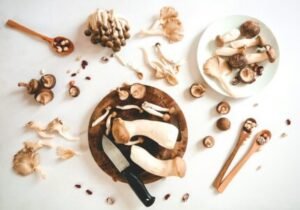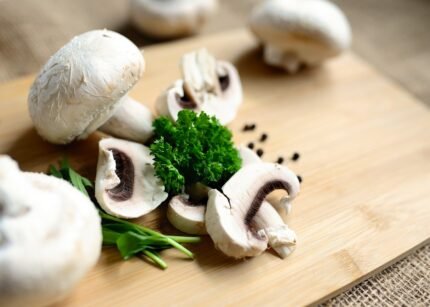Medically reviewed by Dr. Ramesh Gaddam, M.D. — Written by Sumalatha, D.N.H.E
Mushrooms are a type of fungi that belong to the kingdom Fungi. They come in various shapes, sizes, and colors, and they grow in diverse habitats all around the world. While some mushrooms are edible and used in culinary dishes, others are toxic and should be avoided.
Mushroom Nutrition:
Nutrition profile of mushrooms per 100g:
| Nutrient | Amount per 100g |
|---|---|
| Calories | 22 |
| Protein | 3.1g |
| Carbohydrates | 3.3g |
| Dietary Fiber | 1.3g |
| Fat | 0.3g |
| Vitamin D | 0.1µg (1% DV) |
| Thiamine (B1) | 0.1mg (7% DV) |
| Riboflavin (B2) | 0.5mg (29% DV) |
| Niacin (B3) | 3.6mg (18% DV) |
| Pantothenic Acid (B5) | 1.5mg (15% DV) |
| Vitamin B6 | 0.1mg (7% DV) |
| Folate (B9) | 16µg (4% DV) |
| Vitamin C | 2.1mg (4% DV) |
| Vitamin K | 0.5µg (0% DV) |
| Potassium | 318mg (9% DV) |
| Phosphorus | 101mg (10% DV) |
| Magnesium | 9mg (2% DV) |
| Selenium | 9.5µg (14% DV) |
| Copper | 0.3mg (17% DV) |
| Zinc | 0.5mg (3% DV) |
Potential Health Benefits
Potential health benefits of mushrooms are:

Immune System Support:
Mushrooms contain compounds like beta-glucans that may enhance immune function.
They stimulate the production of immune cells such as macrophages and natural killer cells.
Antioxidant Properties:
Certain mushrooms are rich in antioxidants like selenium and ergothioneine.
These antioxidants help combat oxidative stress and reduce the risk of chronic diseases.
Anti-Inflammatory Effects:
Compounds in mushrooms, such as polysaccharides and triterpenes, have been shown to have anti-inflammatory properties.
This may potentially reduce the risk of inflammation-related conditions like arthritis and heart disease.
Heart Health:
Some mushrooms contain compounds like beta-glucans and potassium.
These compounds may help lower cholesterol levels and regulate blood pressure, reducing the risk of cardiovascular diseases.
Cancer Prevention:
Certain mushrooms, such as shiitake and maitake, contain compounds like polysaccharides and lectins.
These have been studied for their potential anticancer properties, including inhibiting tumor growth and stimulating the immune system.
Weight Management:
Mushrooms are low in calories and fat but high in fiber.
This makes them a filling addition to meals that can aid in weight management by promoting satiety and reducing overall calorie intake.
Digestive Health:
The fiber content in mushrooms can support digestive health.
It promotes regular bowel movements and feeds beneficial gut bacteria, which may contribute to a healthy gut microbiome.
Brain Health:
Compounds like hericenones and erinacines found in certain mushrooms, such as lion’s mane, have been studied for their potential to promote nerve growth and cognitive function.
This could potentially reduce the risk of neurodegenerative diseases like Alzheimer’s.
Vitamin D Source:
Some mushrooms, especially those exposed to UV light, are a natural source of vitamin D.
This vitamin is essential for bone health, immune function, and overall well-being.
Nutrient Density:
Mushrooms are nutrient-dense, providing essential vitamins and minerals such as B vitamins (riboflavin, niacin, pantothenic acid), vitamin C, potassium, phosphorus, and selenium.
These are important for various bodily functions.
Types of Mush Rooms
Some common types of mushrooms are:

1. Button Mushrooms (Agaricus bisporus):
- Also known as white mushrooms or champignon mushrooms.
- Mild flavor and versatile, used in various dishes like salads, soups, and stir-fries.
- Available in different sizes, from small to large.
2. Shiitake Mushrooms (Lentinula edodes):
- Popular in Asian cuisine for their rich, savory flavor.
- Can be sautéed, stir-fried, or added to soups and stews.
- Contains compounds believed to have immune-boosting and cholesterol-lowering properties.
3. Portobello Mushrooms:
- Large, meaty mushrooms with a dense texture and robust flavor.
- Often used as a meat substitute in vegetarian dishes or grilled as a burger alternative.
- Mature versions of cremini mushrooms with a more intense taste.
4. Cremini Mushrooms:
- Also known as baby bella or brown mushrooms.
- Similar in flavor to button mushrooms but with a slightly deeper, earthier taste.
- Commonly used in pasta dishes, sauces, and risottos.
5. Oyster Mushrooms (Pleurotus ostreatus):
- Named for their resemblance to oysters in appearance and flavor.
- Delicate and slightly sweet taste, with a tender texture.
- Can be used in stir-fries, soups, and as a meat substitute in some dishes.
6. Chanterelle Mushrooms:
- Distinctive golden-yellow color and trumpet-like shape.
- Delicate, fruity aroma with a mild, peppery flavor.
- Often sautéed or used in cream-based sauces for pasta or meat dishes.
7. Enoki Mushrooms:
- Long, thin stems with small, white caps.
- Mild, slightly crunchy texture and a subtle, sweet flavor.
- Commonly used in Asian cuisine, particularly in soups, salads, and stir-fries.
8. Morel Mushrooms:
- Cone-shaped with a honeycomb texture.
- Rich, earthy flavor and meaty texture.
- Highly prized in gourmet cooking and often used in sauces, risottos, and as a side dish.
9. Porcini Mushrooms (Boletus edulis):
- Large, meaty mushrooms with a nutty, earthy flavor.
- Often used in Italian cuisine, particularly in pasta dishes, risottos, and sauces.
- Available fresh or dried, with dried porcini having a more intense flavor.
10. Lion’s Mane Mushrooms (Hericium erinaceus):
- Unique appearance resembling a lion’s mane with cascading white spines.
- Mild, seafood-like flavor and a tender texture.
- Believed to have potential cognitive and nerve-regenerative benefits.
These are just a few examples of the diverse world of mushrooms, each with its own flavor, texture, and culinary uses.
Uses of Mushrooms
Mushrooms have various culinary, medicinal, and industrial uses. Here are some of the most common uses:

Culinary Uses:
Ingredient in Cooking: Mushrooms are used in a wide range of culinary dishes, including soups, stews, sauces, stir-fries, salads, and pasta dishes.
Meat Substitute: Certain meaty mushrooms like portobello and shiitake can be used as a substitute for meat in vegetarian and vegan dishes, such as burgers, sandwiches, and tacos.
Flavor Enhancer: Mushrooms add depth and umami flavor to dishes, enhancing the overall taste profile.
Appetizers and Side Dishes: Mushrooms are commonly served as appetizers, stuffed with various fillings, or as a side dish sautéed with garlic and herbs.
Medicinal Uses:
Traditional Medicine: Some mushroom species have been used for centuries in traditional medicine systems like Traditional Chinese Medicine (TCM) and Ayurveda for their purported health benefits.
Immune Support: Certain mushrooms, such as reishi and turkey tail, are believed to boost the immune system and improve overall health.
Anti-Inflammatory Properties: Mushrooms like cordyceps and lion’s mane have been studied for their potential anti-inflammatory effects, which may help reduce inflammation in the body.
Brain Health: Lion’s mane mushrooms are particularly renowned for their potential to support cognitive function and promote nerve growth, potentially benefiting brain health.
Industrial Uses:
Bioremediation: Some mushroom species are used in bioremediation processes to clean up environmental pollutants and toxins.
Dye Production: Certain mushrooms contain natural pigments that are used as dyes in textiles and food coloring.
Packaging Materials: Mycelium, the root-like structure of mushrooms, can be used to create biodegradable packaging materials as an eco-friendly alternative to plastics.
Animal Feed: Mushroom waste and by-products are sometimes used as feed for livestock.
Recreational and Psychedelic Use:
Psychedelic Mushrooms: Certain species of mushrooms, such as psilocybin-containing mushrooms (magic mushrooms), are used recreationally for their hallucinogenic effects.
Cultural and Spiritual Practices: Psychedelic mushrooms have also been used in cultural and spiritual practices for thousands of years, particularly in indigenous cultures.
This layout provides clear organization with side headings incorporated into each sentence and double line spacing between each section for readability.
Side Effects of Mushrooms
Common side effects associated with consuming mushrooms:

Allergic Reactions:
Some individuals may be allergic to certain types of mushrooms, leading to allergic reactions ranging from mild symptoms like itching and hives to more severe reactions like difficulty breathing and anaphylaxis.
Digestive Issues:
Eating large quantities of mushrooms or certain types of mushrooms may cause digestive discomfort such as bloating, gas, diarrhea, or stomach cramps, particularly in individuals with sensitive stomachs or digestive issues.
Toxicity:
Some wild mushrooms contain toxins that can cause poisoning if ingested.
Eating poisonous mushrooms can lead to symptoms such as nausea, vomiting, abdominal pain, hallucinations, organ damage, or even death in severe cases.
Drug Interactions:
Certain mushrooms may interact with medications or other substances.
For example, mushrooms containing psilocybin, a hallucinogenic compound, can interact with antidepressants, MAOIs, or other drugs, potentially leading to adverse effects or dangerous interactions.
Psychological Effects:
Psychedelic mushrooms, such as those containing psilocybin, can induce hallucinations, altered perception of reality, mood changes, and intense emotional experiences.
While these effects may be sought after in certain contexts, they can be distressing or overwhelming for some individuals.
Environmental Contaminants:
Mushrooms, especially those harvested from the wild, may accumulate environmental pollutants such as heavy metals, pesticides, or toxic chemicals.
Consumption of contaminated mushrooms can pose health risks due to exposure to these contaminants.
Hypoglycemia Risk:
Some mushrooms, particularly reishi and maitake, may have hypoglycemic effects, meaning they can lower blood sugar levels.
Individuals with diabetes or those taking medication for blood sugar control should monitor their blood glucose levels carefully when consuming these mushrooms.
Drug Misidentification:
Ingesting wild mushrooms without proper identification can be dangerous, as some poisonous mushrooms closely resemble edible varieties.
Accidental ingestion of toxic mushrooms can lead to serious illness or death.
Dependency and Addiction:
Psychedelic mushrooms, due to their psychoactive effects, may carry the risk of psychological dependency or addiction in susceptible individuals.
Regular use can lead to tolerance, dependence, and potential negative consequences on mental health.
Pregnancy and Breastfeeding:
Pregnant or breastfeeding women should exercise caution when consuming mushrooms, especially wild varieties, due to the potential risk of contamination or adverse effects on the developing fetus or infant.
It’s advisable to consult with a healthcare provider before including mushrooms in the diet during these periods.
Mushroom Benefits for Skin
Benefits of mushrooms for Skin health:

1. Hydration and Moisture:
Mushrooms, particularly certain species like shiitake and tremella, contain polysaccharides that can help retain moisture in the skin.
This hydration can improve skin elasticity, smoothness, and overall appearance.
2. Anti-Aging Properties:
Mushrooms are rich in antioxidants, such as selenium and vitamins C and E, which help neutralize free radicals and protect the skin from oxidative stress.
This can reduce the signs of aging, such as wrinkles, fine lines, and age spots.
3. Brightening and Even Tone:
Some mushrooms, like reishi and kojic mushrooms, contain natural compounds that inhibit melanin production.
This can help fade dark spots, hyperpigmentation, and promote a more even skin tone.
4. Anti-Inflammatory Effects:
Compounds found in mushrooms, such as beta-glucans and triterpenes, have anti-inflammatory properties that can soothe and calm irritated skin.
This can be beneficial for conditions like acne, rosacea, and eczema.
5. Collagen Production:
Mushrooms contain compounds like polysaccharides and amino acids that may stimulate collagen production in the skin.
Collagen is essential for maintaining skin elasticity and firmness, thus helping to reduce the appearance of sagging and wrinkles.
6. Protection from UV Damage:
Certain mushrooms, such as the agaricus bisporus extract, have been found to have photoprotective properties, helping to defend the skin against UV-induced damage.
This can reduce the risk of sunburn, premature aging, and skin cancer.
7. Anti-Bacterial and Anti-Fungal Benefits:
Mushrooms like chaga and maitake contain natural antimicrobial compounds that can help fight off bacteria and fungi on the skin, potentially reducing the risk of acne breakouts and other infections.
8. Enhanced Skin Barrier Function:
The bioactive compounds in mushrooms can help strengthen the skin’s natural barrier function, protecting it from environmental stressors and preventing moisture loss.
This leads to healthier, more resilient skin.
9. Soothing Sensitivity:
Mushrooms with anti-inflammatory properties, such as reishi and cordyceps, can help calm sensitive or reactive skin, reducing redness, itching, and discomfort.
10. Detoxification:
Some mushrooms, such as chaga and shiitake, contain compounds that support the body’s natural detoxification processes, which can help promote clearer, healthier-looking skin by removing toxins from the body.
Mushroom Benefits for Hair
Benefits of mushrooms for hair health:

1. Promotes Hair Growth:
Mushrooms are rich in vitamins, minerals, and antioxidants that can nourish the scalp and hair follicles, promoting healthy hair growth.
Compounds like biotin, selenium, and vitamin D found in mushrooms support hair follicle health and stimulate hair growth.
2. Strengthens Hair:
The protein content in mushrooms, along with vitamins like riboflavin (B2) and niacin (B3), helps strengthen hair strands, reducing breakage and split ends. This can result in stronger, more resilient hair.
3. Prevents Hair Loss:
Mushrooms contain nutrients like copper, which is essential for maintaining hair pigment and preventing premature graying.
Additionally, compounds like ergothioneine and polysaccharides found in mushrooms may help prevent hair loss by promoting scalp health and strengthening hair follicles.
4. Improves Scalp Health:
Antioxidants and anti-inflammatory compounds in mushrooms, such as selenium, vitamin C, and beta-glucans, help maintain scalp health by reducing inflammation, combating dandruff, and promoting a balanced scalp environment.
5. Adds Shine and Luster:
The nutrients in mushrooms, including vitamin D and selenium, help nourish the hair shaft, enhancing its natural shine and luster.
Regular use of mushroom-based hair treatments can result in healthier, more radiant-looking hair.
6. Moisturizes and Conditions:
Mushrooms contain polysaccharides that have hydrating properties, helping to moisturize and condition the hair, reducing frizz and improving manageability.
This can be particularly beneficial for dry or damaged hair.
7. Reduces Scalp Irritation:
Compounds like beta-glucans found in mushrooms have soothing properties that can help reduce scalp irritation and itchiness, providing relief for those with sensitive or irritated scalps.
8. Protects Hair from Damage:
Antioxidants in mushrooms protect hair from environmental damage caused by UV radiation, pollution, and free radicals.
This can help prevent hair from becoming dry, brittle, or damaged over time.
9. Improves Hair Texture:
Regular use of mushroom-based hair treatments can improve the overall texture of the hair, making it softer, smoother, and more manageable.
10. Balances Oil Production:
Mushroom extracts help regulate sebum production on the scalp, ensuring that hair is neither too oily nor too dry.
This helps maintain a healthy scalp environment and reduces the risk of greasy or oily hair.
Mushroom Benefits for Men
Benefits of mushrooms specifically for men:

1. Prostate Health:
Mushrooms contain compounds like beta-glucans and ergosterol that have been linked to prostate health.
Some research suggests that consuming mushrooms regularly may help reduce the risk of prostate cancer and improve overall prostate function.
2. Testosterone Regulation:
Certain mushrooms, such as cordyceps, have been studied for their potential to support testosterone production and regulation.
Cordyceps may help balance hormone levels in men, promoting optimal testosterone function.
3. Athletic Performance:
Mushrooms like cordyceps have been traditionally used to enhance stamina, endurance, and athletic performance.
They may help improve oxygen utilization and increase energy levels, making them beneficial for active men.
4. Immune Support:
Mushrooms contain various bioactive compounds, including beta-glucans and polysaccharides, that support immune function.
Strengthening the immune system can help men stay healthy and ward off illnesses.
5. Heart Health:
Some mushrooms, such as shiitake and maitake, contain compounds that may help lower cholesterol levels and improve heart health.
Including these mushrooms in the diet can contribute to a healthy cardiovascular system.
6. Brain Health and Cognitive Function:
Compounds like hericenones and erinacines found in certain mushrooms, such as lion’s mane, have been studied for their potential to promote nerve growth and cognitive function.
This can help support brain health and maintain cognitive abilities as men age.
7. Weight Management:
Mushrooms are low in calories and fat but high in fiber, making them a filling and nutritious addition to meals.
Incorporating mushrooms into the diet can aid in weight management by promoting satiety and reducing overall calorie intake.
8. Anti-Inflammatory Effects:
Compounds in mushrooms, such as polysaccharides and triterpenes, have anti-inflammatory properties that may help reduce inflammation-related conditions like arthritis and heart disease, which are common concerns for men.
9. Antioxidant Protection:
The antioxidants found in mushrooms help neutralize free radicals and protect cells from oxidative damage.
This can benefit overall health and may reduce the risk of chronic diseases.
10. Hair and Skin Health:
Mushrooms contain nutrients that support hair and skin health, such as vitamin D, selenium, and biotin.
These nutrients contribute to healthy hair growth, skin elasticity, and overall appearance.
Mushroom Benefits for Women
Benefits of mushrooms specifically for women:

1. Hormonal Balance:
Certain mushrooms, like reishi and chaga, contain adaptogenic properties that may help support hormonal balance in women.
They can help regulate menstrual cycles, reduce symptoms of PMS, and support overall hormonal health.
2. Bone Health:
Mushrooms are a natural source of vitamin D, which is essential for calcium absorption and bone health.
Consuming mushrooms regularly may help reduce the risk of osteoporosis and maintain strong, healthy bones, especially in postmenopausal women.
3. Immune Support:
Mushrooms contain beta-glucans and other bioactive compounds that support immune function.
Strengthening the immune system can help women stay healthy and fend off illnesses, particularly during periods of stress or hormonal changes.
4. Skin Health:
The antioxidants and vitamins found in mushrooms, such as vitamin C and selenium, can promote healthy skin by protecting against oxidative damage, reducing signs of aging, and supporting collagen production.
5. Weight Management:
Mushrooms are low in calories and fat but high in fiber, making them a nutritious addition to meals for women watching their weight.
The fiber content helps promote satiety and can aid in weight management by reducing overall calorie intake.
6. Energy and Stamina:
Certain mushrooms, like cordyceps, have been traditionally used to enhance energy levels and improve stamina.
Women may benefit from incorporating cordyceps into their diet to support endurance during physical activity or periods of high stress.
7. Heart Health:
Mushrooms contain compounds like beta-glucans and potassium that may help lower cholesterol levels and regulate blood pressure, reducing the risk of cardiovascular diseases in women.
8. Mood and Stress Management:
Adaptogenic mushrooms like reishi and lion’s mane may help support mood balance and reduce stress levels in women.
These mushrooms can help promote feelings of calmness and relaxation, supporting mental well-being.
9. Digestive Health:
The fiber content in mushrooms can support digestive health by promoting regular bowel movements and feeding beneficial gut bacteria.
This can help prevent digestive issues like constipation and bloating in women.
10. Antioxidant Protection:
Mushrooms are rich in antioxidants, such as selenium and ergothioneine, which help neutralize free radicals and protect cells from damage.
This can benefit overall health and may reduce the risk of chronic diseases in women.
Mushroom Benefits for Weight Loss
benefits of mushrooms for weight loss:

1. Low in Calories and Fat:
Mushrooms are low in calories and fat, making them an excellent addition to weight loss diets.
They provide volume and satiety to meals without adding significant calories, helping to control overall calorie intake.
2. High in Fiber:
Mushrooms are a good source of dietary fiber, which adds bulk to meals and promotes feelings of fullness.
This can help reduce appetite, prevent overeating, and support weight loss by controlling hunger.
3. Nutrient-Dense:
Despite being low in calories, mushrooms are rich in essential nutrients like vitamins (such as B vitamins, vitamin D, and vitamin C), minerals (such as potassium, selenium, and phosphorus), and antioxidants.
This ensures that you get vital nutrients while managing your weight.
4. Water Content:
Mushrooms have a high water content, which contributes to their low calorie density. Eating foods with high water content, like mushrooms, can help keep you hydrated and satisfied while consuming fewer calories.
5. Slow Digestion:
The fiber and protein content in mushrooms can slow down digestion and promote a feeling of fullness, which may help control appetite and reduce snacking between meals.
6. Fat Replacement:
Mushrooms can be used as a healthy substitute for higher-calorie and higher-fat ingredients in recipes.
For example, using finely chopped mushrooms in place of some ground meat in dishes like burgers or pasta sauces can reduce calorie and fat content while adding bulk and flavor.
7. Metabolism Boost:
Some mushrooms, such as shiitake and maitake, contain compounds that may help boost metabolism and promote fat burning.
Incorporating these mushrooms into your diet may support weight loss efforts.
8. Blood Sugar Regulation:
The fiber and antioxidants in mushrooms can help stabilize blood sugar levels, preventing spikes and crashes that can lead to cravings and overeating.
This can support weight management, particularly for individuals with diabetes or insulin resistance.
9. Versatile and Flavorful:
Mushrooms are versatile ingredients that can be added to a wide variety of dishes, from salads and stir-fries to soups and omelets.
Their savory flavor enhances the taste of meals without the need for added fats or calories.
10. Supports Gut Health:
The fiber in mushrooms feeds beneficial gut bacteria, promoting a healthy gut microbiome.
A balanced gut microbiome is associated with better digestion, nutrient absorption, and weight management.
Also Read:
Ice Apple: Benefits, Nutrition, Uses, Side Effects
12 Powerful Benefits of Drumstick Seeds (Moringa)
Medically reviewed by Dr. Ramesh Gaddam, M.D.

General Physician, Diabetologist, and Critical Care Specialist.
Discover more from Health Build-Up
Subscribe to get the latest posts sent to your email.

4 thoughts on “Are mushrooms a Superfood?”
Comments are closed.